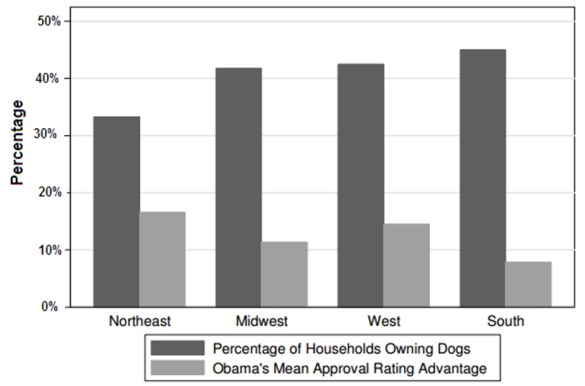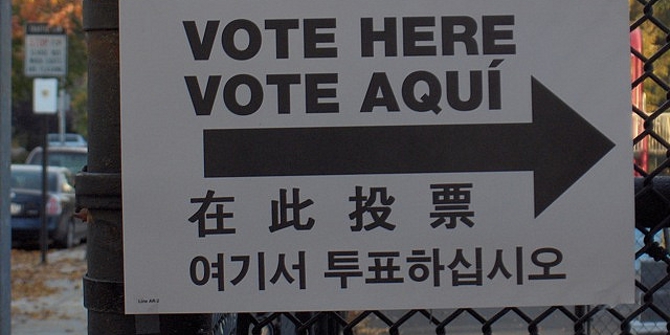 Matthew L. Jacobsmeier responds to the claim that during the 2008 Presidential campaign, the fact that Barack Obama did not own a dog turned some voters away from him. He argues that Americans in southern states, where dog ownership is particularly common, are more likely to hold distinctively conservative attitudes, including racial attitudes, that are not captured by typically-used measures of ideology, and were more likely to vote for John McCain because of these attitudes. Once this fact is accounted for, dog ownership appears to have little effect on voting preferences.
Matthew L. Jacobsmeier responds to the claim that during the 2008 Presidential campaign, the fact that Barack Obama did not own a dog turned some voters away from him. He argues that Americans in southern states, where dog ownership is particularly common, are more likely to hold distinctively conservative attitudes, including racial attitudes, that are not captured by typically-used measures of ideology, and were more likely to vote for John McCain because of these attitudes. Once this fact is accounted for, dog ownership appears to have little effect on voting preferences.
Presidential election campaigns in the United States are often dog-eat-dog affairs. Recent research suggests, however, that dogs may play more than a merely metaphorical role in American politics. In 2010, Diana Mutz published a seemingly tongue-in-jowl study on the role of man’s best friend in the 2008 presidential election contest between Barack Obama and John McCain (“The Dog That Didn’t Bark: The Role of Canines in the 2008 Campaign”). Using survey data and statistical methods commonly employed in political science research, Mutz finds that Barack Obama was penalized by pooch-owning voters for not having a dog. Moreover, Mutz contends, Obama’s discussion of his daughters’ desire for a puppy during the campaign likely contributed to the problem by highlighting his lack of a furry, four-legged friend.

Although my colleague Dan Lewis and I were duly impressed by Mutz’s work on the canine constituency — and also appreciated the tribute it paid to the late Lee Sigelman, an influential scholar with a great sense of humor – we suspected that the “dog gap” was not being driven by voters’ affinity for dogs. Rather, it resulted from factors that Mutz had failed to account for. Namely, regional political differences and conservative racial attitudes, two doggedly persistent features of the American political landscape, resulted in certain voters being both more likely to own dogs and less likely to report positive evaluations of Barack Obama. Using the same data that Mutz uses, we show that in 2008, Obama didn’t so much have trouble with dog owners as he had trouble with conservative, rural, white, Southern voters.
How can political differences across regions of the United States help to explain the dog gap identified by Mutz? The answer, at least on the surface, is simple. Dog ownership is more common in some regions than others. Likewise, evaluations of Barack Obama vary by region. As shown in Figure 1, for example, dog ownership is most common in the South, the region where, on average, evaluations of Barack Obama exceeded those of John McCain by the greatest amount in 2008. Moreover, in the context of American politics, being, say, “extremely conservative” in the Northeast does not necessarily mean the same thing as being extremely conservative in the South. Indeed, we show that when survey respondents’ ideologies are measured using their stated preferences with respect to several policy issues, southern white respondents who place themselves on an ideological scale are more conservative in terms of policy preferences than white respondents from other regions who place themselves at the same location on that scale.
Figure 1 – Dog Ownership and Obama’s Approval Rating Advantage by Region
These differences in what we refer to as operational ideology are important in that the more operationally conservative a respondent was, the less likely they were to support the more liberal candidate, Democrat Barack Obama. Part of what is happening in Mutz’s models of attitudes and voting behavior, then, is that some of what is being attributed to dog ownership in itself is actually a result of Americans in southern states, who are more likely than others to own dogs, being more conservative than Americans from other regions in a way that the standard measure of ideology used in Mutz’s analysis doesn’t capture. Patterns of dog ownership mirror patterns of operational ideology and this fact lends itself to the mistaken conclusion that dog ownership has a causal effect on voting decisions.
What about race? As it turns out, racial attitudes are also related to the likelihood of dog ownership. The correlation between racial attitudes can be partially explained by the regional difference in dog ownership rates described above. As Figure 2 shows, residents of states with higher rates of dog ownership tend to have more conservative racial attitudes. In 2008, states of the former Confederacy with strong historical legacies of slavery, such as Louisiana, Mississippi, and North Carolina, ranked highly in both average levels of racial prejudice (as measured by Highton 2011) and dog ownership.
Figure 2 – State-Level Racial Prejudice vs. Dog Ownership
The story, however, is not purely about region. Although we are unsure of the reasons, we find that respondents with racially conservative attitudes are more likely than other respondents to own dogs, even when region and other relevant variables are taken into account. Unsurprisingly, respondents with racially conservative attitudes were less likely than others to have positive feelings about the first African-American candidate to win a major party’s nomination for the presidency, as well. When racial attitudes are included in Mutz’s models, dog ownership becomes a much weaker predictor of voting against Obama in 2008.
By the time the 2012 presidential election campaign rolled around, a Portuguese water dog named Bo was a beloved member of the Obama family. (We decline to speculate on the significance of the fact that Bo’s name is composed of the President’s first and last initials.) While we are not aware of any reports that the Obama administration was familiar with Mutz’s research on the power of the pooch, Bo was quite visible in the year leading up to Election Day, especially when cameras were expected to be rolling. Whether Bo’s appearances were strategic maneuvers or not, our research suggests that he probably didn’t fetch many votes for his owner. While we cannot rule out the possibility that dog ownership affects politics in other ways, evidence of puppy persuasion at the voting booth is lacking.
To dog lovers, the lack of a statistically significant dog factor in presidential election campaigns might be disappointing. We feel, however, that Bo has done a great service in providing a platform for focusing attention on the continuing importance of racial attitudes and regional divisions in American politics. Moreover, the literature on pets and politics is burgeoning, with Maltzman, et al.’s “Unleashing Presidential Power: The Politics of Pets in the White House,” which examines the conditions under which presidential pets are most likely to make public appearances, serving as another example. Lastly, it seems highly likely that the Obama family’s apparent love of dogs is genuine rather than a cold political calculation. Given that President Obama cannot run for a third term, it is unlikely that the Obama’s recent adoption of Sunny, another Portuguese water dog, was a matter of electoral strategy.
This article is based on the paper, “Barking Up the Wrong Tree: Why Bo Didn’t Fetch Many Votes for Barack Obama in 2012,” in the January 2013 issue of PS: Political Science & Politics. This article will be open access until 2 December.
Please read our comments policy before commenting.
Note: This article gives the views of the authors, and not the position of USApp– American Politics and Policy, nor of the London School of Economics.
Shortened URL for this post: bit.ly/18i4cAE
_________________________________
 Matthew L. Jacobsmeier – West Virginia University
Matthew L. Jacobsmeier – West Virginia University
Matthew L. Jacobsmeier is an assistant professor of political science at West Virginia University. His research deals with representation, public opinion, and political behavior, and focuses on the effects of race and religion. His work has appeared in State Politics and Policy Quarterly, Politics and Religion, PS: Political Science and Politics, and edited volumes.






